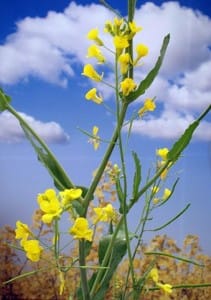Portland Business Journal
By Robert Goldfield

Sergei S. Scurfield.
Willamette Valley seed producers have seized upon the discovery of genetically modified wheat in an eastern Oregon farm field as one more reason to ban canola production.
Producers of “specialty seed” — a term for a wide variety of vegetable and flower seeds — deem it a $50 million Willamette Valley crop. Fearing contamination of their seeds from canola, they’ve been seeking to overturn an Oregon Department of Agriculture rule allowing canola production in parts of the valley.
Japan and other countries expressing deep concern over the purity of the Northwest’s soft white wheat crop are just as likely to turn up their noses at specialty seed grown anywhere near canola, much of which is genetically modified, said Nick Tichinin, owner of Universal Seed Co., located in Independence. That’s especially true for cabbage, broccoli and kale, which hail from the same family as canola.
Tichinin said he testified before the state Agriculture Board on Wednesday that the Department of Agriculture should stick to its previous boundaries for growing canola.
“Our situation with canola is absolutely no different than the discovery of GMO wheat,” Tichinin said.
Ivan Maluski, policy director with the Friends of Family Farmers, said international seed customers need assurance that the seeds they purchase are pure.
“The economic fallout if GMO traits from canola spread into these crops or into Willamette Valley seed populations is very real, and the international reaction to GMO wheat in eastern Oregon only underscores this,” Maluski said in an e-mail.
Since 2005 canola production in the Willamette Valley has been limited to a narrow area. The Department of Agriculture last year decided to change those boundaries, worrying many specialty seed producers.
Proposed legislation, House Bill 2427, would prohibit raising canola in the Willamette Valley. That bill currently resides in the Joint SubCommittee on Natural Resources.

